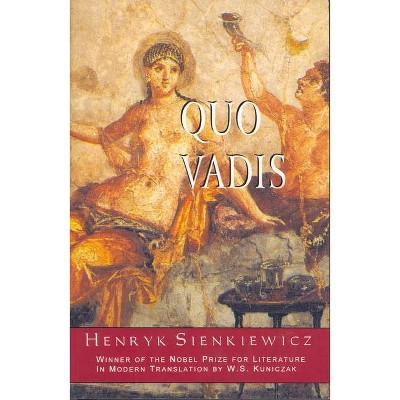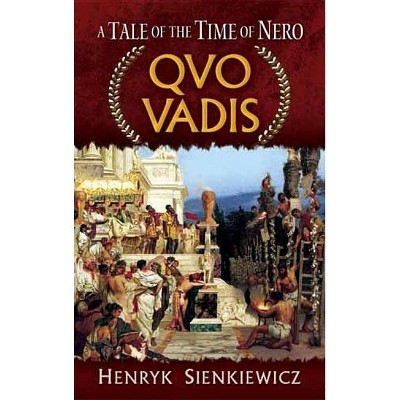Quo Vadis? - by Henryk Sienkiewicz (Paperback)

Similar Products
Products of same category from the store
AllProduct info
<p/><br></br><p><b> About the Book </b></p></br></br>Rome during the reign of Nero was a glorious place for the emperor and his court; there were grand feasts, tournaments for poets, and exciting games and circuses filling the days and nights. The pageantry and pretentious displays of excess were sufficient to cloy the senses of participants as well as to offend the sensitive. Petronius, a generous and noble Roman, a man of the world much in favor at the court of Nero, is intrigued by a strange tale related by his nephew Marcus Vinitius of his encounter with a mysterious young woman called Ligia with whom Vinitius falls madly in love. Ligia, a captured King's daughter and a one-time hostage of Rome, is now a foster child of a noble Roman household. She is also a Christian. The setting of the narrative was prepared with utmost care. Henryk Sienkiewicz visited the Roman settings many times and was thoroughly educated in the historical background. As an attempt to create the spirit of antiquity, the novel met with unanimous acclaim, which earned the Nobel Prize in literature for the author in 1905. As a vision of ancient Rome and early Christianity it has not yet been surpassed, almost a century later.<p/><br></br><p><b> Book Synopsis </b></p></br></br><p><strong>This glorious saga unfolds against the backdrop of ancient Rome--from the Forum to the Coliseum, from banquet halls to summer retreats in Naples, from the luxurious houses of the nobility to the hovels of the poor, <em>Quo Vadis</em> richly depicts a place and time still captivating to the modern imagination. This radiant translation by W.S. Kuniczak restores the original glory and richness of master storyteller Henryk Sienkiewicz's epic tale.</strong></p><p>Set at a turning point in history (A.D. 54-68), as Christianity replaces the era of corruption and immorality that marked Nero's Rome, <em>Quo Vadis</em> abounds with compelling characters, including: </p><ul><strong>Vinicius, the proud centurion who has fallen deeply in love with a mysterious young woman who disappears the night they meet;</strong><strong><p>Ligia, the elusive beauty. Vinicius will not easily win her love, for she is a Christian, one of the group of dedicated believers led by the apostle Peter. Christians are rare in pagan, hedonistic Rome, and suffer great persecution;</strong></p><p><strong>Petronius, uncle to Vinicius, an elegant, witty courtier who scoffs at love and religion but finds his nephew's passion charming; and</strong></p><p><strong>Nero himself, enemy of all Christians, a despotic emperor who plunges Rome deeper and deeper into depravity. The decadence of his banquets is staggering; and even worse, his mad laughter is heard echoing in the amphitheater as gladiators duel to the death.</strong></li> </ul></p><p>As Nero's appalling plans for the Christians become ever clearer, time appears to be running out for the young lovers. Vinicius must come to understand the true meaning of Ligia's religion before it is too late.</p><p>Grand in scope and ambition, <em>Quo Vadis</em> explores the themes of love, desire and profound moral courage. Lavish descriptions, vivid dialogue and brilliantly drawn characters make this one of the world's greatest epics. Beloved by children and adults the world over, <em>Quo Vadis</em> has been the subject of five films, two of them in English.</p><p/><br></br><p><b> From the Back Cover </b></p></br></br>An epic saga of love, courage and devotion in Nero's time, 'Quo Vadis' portrays the degenerate days leading to the fall of the Roman empire and the glory and the agony of early Christianity.<p/><br></br><p><b> Review Quotes </b></p></br></br><br><p><strong>"Sienkiewicz wrote <em>Quo Vadis</em> for the entire world and the world took it to its heart."--James Michener</strong></p><br>
Price History
Price Archive shows prices from various stores, lets you see history and find the cheapest. There is no actual sale on the website. For all support, inquiry and suggestion messages communication@pricearchive.us




















